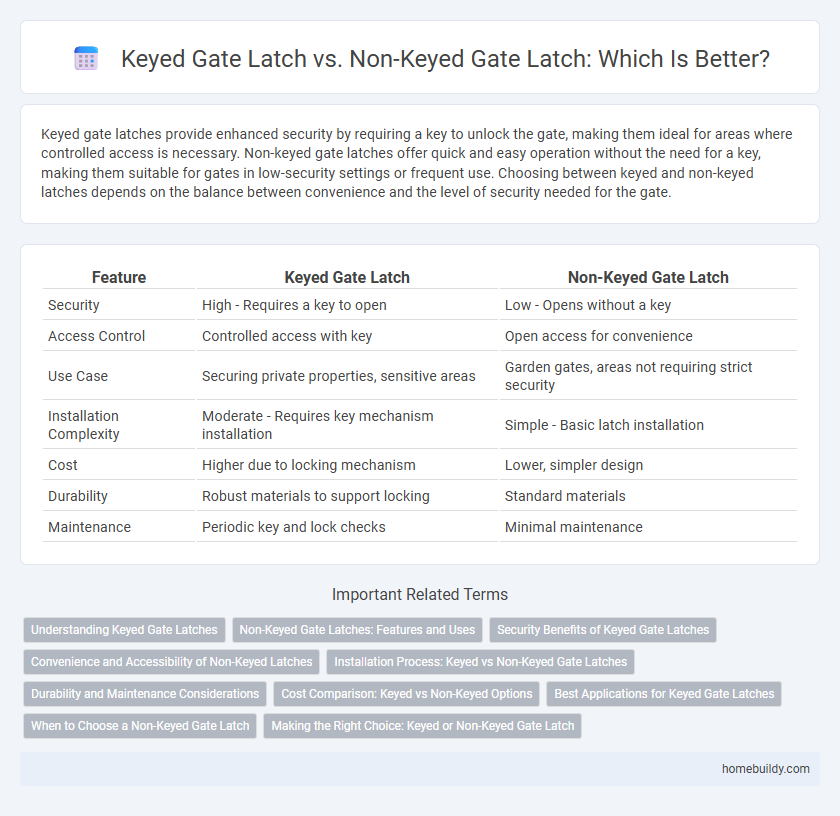Keyed gate latches provide enhanced security by requiring a key to unlock the gate, making them ideal for areas where controlled access is necessary. Non-keyed gate latches offer quick and easy operation without the need for a key, making them suitable for gates in low-security settings or frequent use. Choosing between keyed and non-keyed latches depends on the balance between convenience and the level of security needed for the gate.
Table of Comparison
| Feature | Keyed Gate Latch | Non-Keyed Gate Latch |
|---|---|---|
| Security | High - Requires a key to open | Low - Opens without a key |
| Access Control | Controlled access with key | Open access for convenience |
| Use Case | Securing private properties, sensitive areas | Garden gates, areas not requiring strict security |
| Installation Complexity | Moderate - Requires key mechanism installation | Simple - Basic latch installation |
| Cost | Higher due to locking mechanism | Lower, simpler design |
| Durability | Robust materials to support locking | Standard materials |
| Maintenance | Periodic key and lock checks | Minimal maintenance |
Understanding Keyed Gate Latches
Keyed gate latches provide enhanced security by requiring a specific key to unlock, making them ideal for protecting restricted areas or valuable property. Non-keyed gate latches offer basic convenience and quick access without the need for a key, suitable for low-risk environments. Understanding keyed gate latches involves recognizing their role in preventing unauthorized entry through durable locking mechanisms and tamper-resistant designs.
Non-Keyed Gate Latches: Features and Uses
Non-keyed gate latches offer convenient access control by allowing easy opening without the need for a key, making them ideal for internal gates, gardens, and fences where secure locking is unnecessary. These latches typically feature a simple thumb latch or lever mechanism, providing quick operation and durability for frequent use. Non-keyed gate latches are favored in residential and commercial settings where ease of access and minimal security requirements are prioritized.
Security Benefits of Keyed Gate Latches
Keyed gate latches offer enhanced security by requiring a specific key for access, effectively preventing unauthorized entry and tampering. Unlike non-keyed gate latches, keyed versions provide a physical deterrent against theft and vandalism, making them ideal for securing residential and commercial properties. The high-quality locking mechanism in keyed latches ensures long-term durability and resistance to common break-in methods.
Convenience and Accessibility of Non-Keyed Latches
Non-keyed gate latches offer superior convenience and accessibility by allowing quick and easy operation without the need for a key, making them ideal for frequently accessed gates. They provide swift entry and exit, reducing the hassle in situations where rapid access is essential, such as gardens, pools, or pet areas. In contrast, keyed gate latches, while more secure, can delay access and require carrying or locating keys, which may be inconvenient during busy or emergency situations.
Installation Process: Keyed vs Non-Keyed Gate Latches
Keyed gate latches require precise alignment during installation to ensure the lock mechanism functions correctly, often involving mounting the latch and the keyed lock cylinder securely on opposing gate components. Non-keyed gate latches have a simpler installation process, typically involving fewer parts and straightforward mounting with screws on one or both gate panels. Proper measurement and tool use are critical in both types to maintain gate security and smooth operation.
Durability and Maintenance Considerations
Keyed gate latches offer enhanced security with durable materials like stainless steel, reducing wear and requiring less frequent replacement compared to non-keyed versions. Non-keyed gate latches typically experience more maintenance due to simpler locking mechanisms prone to loosening or corrosion in outdoor environments. Choosing a keyed gate latch minimizes maintenance time and extends service life, especially in high-traffic or exposed locations.
Cost Comparison: Keyed vs Non-Keyed Options
Keyed gate latches typically incur higher costs due to the added security features and the complexity of the locking mechanism, making them a more expensive choice compared to non-keyed options. Non-keyed gate latches are generally more affordable and simpler to install, offering basic functionality without the enhanced protection. When budgeting for gate hardware, the cost difference between keyed and non-keyed latches should be weighed against security needs and installation requirements.
Best Applications for Keyed Gate Latches
Keyed gate latches provide enhanced security by requiring a key to unlock, making them ideal for applications where restricted access is necessary, such as residential gates, commercial properties, and secure enclosures. These latches are best used in areas needing controlled entry to prevent unauthorized access, including pool gates, storage yards, and utility gates. In contrast, non-keyed gate latches suit locations where convenience outweighs security, like garden gates or interior gates within private properties.
When to Choose a Non-Keyed Gate Latch
A non-keyed gate latch is ideal for areas requiring quick and easy access without compromising basic security, such as garden gates, interior fences, or low-traffic perimeter gates. This type of latch offers convenience and can typically be operated from either side without a key, making it suitable for environments where controlled access or frequent entry and exit are necessary. Opt for a non-keyed gate latch when security demands are minimal and ease of use is prioritized over restricted entry.
Making the Right Choice: Keyed or Non-Keyed Gate Latch
When selecting between a keyed gate latch and a non-keyed gate latch, consider the level of security required for your property. Keyed gate latches provide enhanced protection by requiring a key to unlock, making them ideal for securing private areas or preventing unauthorized access. Non-keyed latches offer convenient, easy access for frequently used gates but may lack the security needed for sensitive locations.
keyed gate latch vs non-keyed gate latch Infographic

 homebuildy.com
homebuildy.com